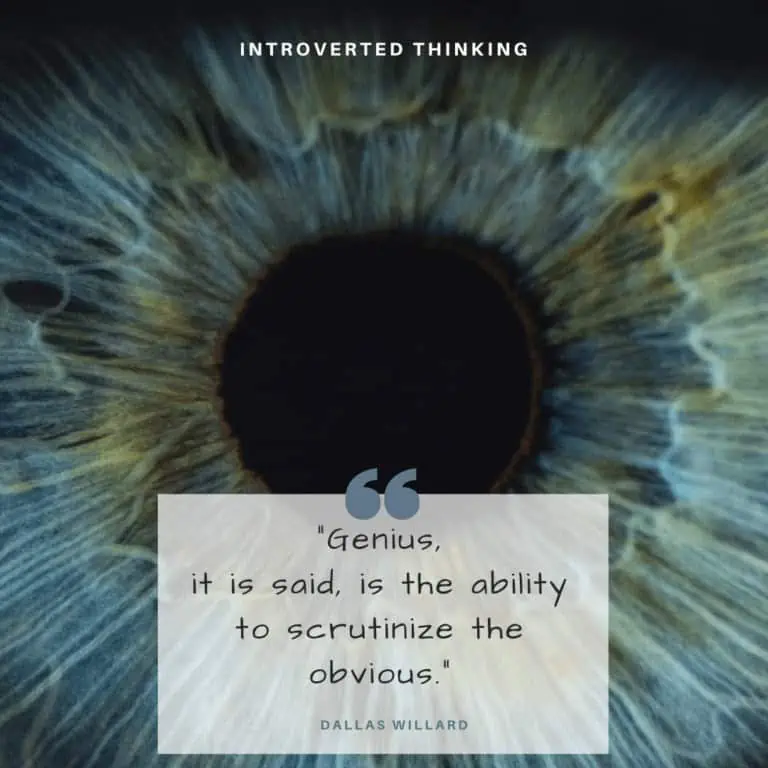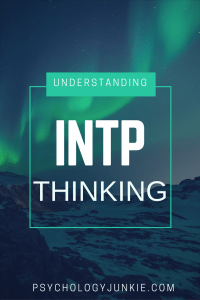Understanding INTP Thinking
“Nothing in life is to be feared, it is only to be understood. Now is the time to understand more, so that we may fear less.”
– Marie Curie, an INTP
INTPs are the architects of understanding, the explorers of abstract theories, and the champions of conceptual thought. From science textbooks to philosophical tomes, their influence is everywhere. Albert Einstein’s relativity, Marie Curie’s groundbreaking work in radioactivity, and Abraham Lincoln’s nuanced moral reasoning all bear the INTP hallmark: a relentless pursuit of clarity and truth.

But what makes the INTP’s thought process so singular? Why is their approach to logic so distinct from that of the other 15 personality types? That’s what we’re going to unpack in this article. If you’re an INTP (or know one), prepare to get into the fascinating mechanics of Introverted Thinking (Ti) and Extraverted Intuition (Ne) that drive their brilliance—and their struggles.
Not sure what your personality type is? Take our new personality questionnaire here. Or you can take the official MBTI® here.
INTPs are masters of understanding conceptual issues through deep insight, patient curiosity, and logic. They question pre-conceived rules and try to understand complex issues from new angles. Because INTPs are willing to question traditional rules and theories, they have been able to uncover truths that many other types would have considered “crazy.” Albert Einstein’s theory of relativity was received with skepticism by the scientists of his day. Sergey Brin, the founder of Google, was unable to sell his search engine idea to Altavista, Yahoo! & Excite. If you look at the life of nearly any INTP you’ll see that their paths to success were marked with rejection and dismissals. Thankfully, their insights and determination eventually led to many of the great discoveries we take for granted today.
“The true sign of intelligence is not knowledge but imagination.”
– Albert Einstein
Ti: The Analytical Powerhouse
Strengths:
- Thorough Analysis: INTPs examine concepts from every angle before drawing conclusions. Ti ensures their judgments are deeply rooted in logic and evidence.
- Sophisticated Reasoning: Ti deduces, defines, categorizes, weigh odds, and navigates abstract problems effectively.
- Independent Problem-Solving: They prefer to use their own methods to figure things out, often avoiding step-by-step instructions in favor of their unique approach.
- Backtracking for Accuracy: INTPs frequently revisit and refine their thoughts, making sure they have consistency.
- Adaptability to Sparse Data: Ti-users can work with minimal information, using visual, spatial, or symbolic thinking to fill in gaps and solve problems creatively.
- Framework Creation: They construct theories and systems that become the foundation for future innovations, whether in science, philosophy, or technology.
- Problem Detection: INTPs are quick to identify inconsistencies or flaws in logic, making them excellent at spotting issues others might overlook.
Weaknesses:
- Ti’s hyper-focus on logic can make INTPs seem aloof or uncaring. They’re not; they’re just busy fine-tuning their mental models.
- They may nitpick seemingly minor details or struggle with small talk, which can make forming relationships a challenge.
- Unhealthy Ti can lead to cherry-picking data to fit their preferred frameworks, ignoring evidence that challenges their assumptions.
Ne: The Imaginative Spark
If Ti is the INTP’s engine, Ne is the fuel. Ne drives their curiosity, helping them see possibilities others overlook. It’s why Sergey Brin didn’t stop after Yahoo! rejected Google. He saw potential where others saw a dead end.
Understanding Introverted Thinking
Introverted Thinking (Ti) is focused on intensely expanding one’s own knowledge of a subject and finding how it is related to other subjects. Introverted thinkers are analytical and internally organized in their thoughts. One could imagine their minds as having little doors, each leading to specific libraries, each holding a multitude of books on a particular subject. Where Extraverted Thinking (Te) is largely focused on gathering enough information to make an effective choice, Introverted Thinking (Ti) analyzes and organizes knowledge internally. It’s not so much interested in learning to “do” as interested in learning to “know.” Introverted thinkers have very little interest in directing other people and have more interest in organizing and expanding their own knowledge base. They are interested in knowledge for knowledge’s sake, not just to achieve something.
Introverted Thinking is almost never-ending in its scope. Ti-users like to expand and mold their thought process constantly. They are always making room for new information and regularly consider multiple angles. As a result, INTPs can instantly detect logical shortcomings in any line of reasoning. They are quick to discern what doesn’t make sense or isn’t true – but have less confidence explaining what “is” true. This is because they don’t like to make up their minds on something until they’ve explored every possible perspective and ensured that everything checks out. They hold themselves to incredibly high standards about what they believe in, accept, study, and promote.
Introverted thinkers are very independent in the way they gather information. Typologist A.J. Drenth says in his book My True Type: Clarifying Your Personality Type, Preferences & Functions that Ti-users “despise working in a cookie-cutter, step-by-step fashion. Eschewing instruction manuals and “how-to” guides whenever possible, they prefer to use their own methods and powers of reasoning to figure things out.”
A good way to understand this is to imagine an ISTJ and an INTP fixing a washing machine. The ISTJ uses Extraverted Thinking (Te), and would probably look at the manual before getting started on the project and follow the outlined guide. They’re not interested in learning all the nuts and bolts about the washing machine; they just want the necessary information needed to fix it.
The INTP who uses Introverted Thinking (Ti) would probably gather a lot more information about the machine itself. They’d want to understand the nuts and bolts, how it’s constructed, and why, in order to fix it. Now, of course, there are variations, and some INTPs may just be in a rush to fix the problem and resort to looking at the manual anyway. But for the most part, INTPs want to understand all the components before they leap into action.
Characteristics of INTPs:
- They highly value imagination and creativity
- They are analytical and thorough in their thought process
- They are driven to understand underlying principles.
- They are skeptical and questioning.
- They are internally organized about ideas and concepts.
- They dislike organizing people or external situations.
- They are perceptive and aware of possibilities and potential.
- They are private and reserved.
- They love to research and find solutions but are often less interested in carrying them out.
- They are intellectual and independent.
- They are excellent problem-solvers
The Neuroscience of INTP Thinking:
According to Dario Nardi, the author of Neuroscience of Personality: Brain Savvy Insights for All Types of People, INTPs “show high use of four brain regions that afford complex logical reasoning….Ti types dedicate themselves to using brain resources that other people tend to neglect.” These four regions are in charge of many different tasks: linearly deriving solutions, categorizing and defining concepts, integrating visual-kinesthetic data, and holistically weighing numerous pros and cons of many factors or options. Nardi suggests that Ti-users can think even when there are visual, auditory, and kinesthetic distractions. As a result, Ti-users can detach themselves from the current moment to think through a problem clearly.
Ti users are also intensely stimulated mentally by debate and argument. According to Nardi, during an argument or debate about religion, politics, or philosophy they engage six separate brain regions that indicate “maximal attention to examining a topic from multiple angles – each angle from a different brain region – while integrating the angles into a coherent way as a part of an explanation or decision.”
The INTPs Inner Control and Outer Adaptability
One of the biggest struggles for the INTP is to find a balance between their inner sense of control and their desire for autonomy. Because INTPs have a dominant internalized judging function (Ti), they hold themselves to very high internal standards. They must understand their beliefs, their ideas, their theories in their own way and they will resist any external efforts to control them.
Outwardly INTPs are seen as adaptable and easy-going. People who don’t understand their thought process often consider them “lazy.” Yet the truth is they have little interest in ordering the outer world or keeping up with the mundane details of daily life. If they have no current interest in a topic, or their imagination isn’t stimulated in some way, they will be unlikely to give a project their full attention. This is why many young INTPs are especially misunderstood.
In elementary school, where the focus is often on rote memorization or scoring well on a standardized test, the curious, intellectual mind of the INTP is often bored. They don’t care so much about getting the “perfect” grades because their internal sense of logic and success is far more important than anything that the external world, or their teachers, might think.
INTPs desire to maximize their freedom and they are fiercely independent. Any threat to their autonomy is met with intense resistance. Thriving under standardized policies, procedures, and protocols is very difficult for them. For this reason, they may be at odds with bosses or leaders who try to control or micro-manage them. INTPs must have freedom and be allowed to follow their own approach. They are often happier when they can be entrepreneurs or start their own businesses so that they can discard any “irrelevant” rules. They would rather be at risk for financial instability than to rely on bureaucracy or organizational structures that tie them down intellectually.
In my experience, I’ve seen that INTPs tend to struggle with a simultaneous desire for autonomy and affirmation. INTPs have inferior Extraverted Feeling (Fe), a function that’s all about connection and emotional responsiveness. Even though it’s inferior, it’s still highly valued by them. INTPs want friendships and connections, they often just don’t know how to get them. They may struggle with communicating their needs or desires, but deep down they are often anxious about being forever alone or misunderstood. I’ve met so many INTPs in my time as a practitioner who felt perpetually rejected or out-of-place with others. People often confuse their analytical, quiet nature with insensitivity or lack of caring. The truth is much more nuanced. INTPs are human, after all, and as humans need connection. The ways they go about connecting with others are just not the norm.
How INTPs Connect with Others:
INTPs connect with others via their Extraverted Intuition. Pose an interesting theory and you’ll be chatting with them for hours. Brainstorm a dozen ways to solve a problem, and they’ll be game. However, if your way of connecting is chit-chatting about the latest celebrity gossip or probing them for emotional insights, they might clam up. Often they feel unsure about where they stand with people and what people need socially. While they may go for long periods alone with their thoughts, over time their inferior Fe might remind them that they desire the warmth and friendship of others. They may go through bouts of seclusion and then spikes of social interaction followed by another bout of seclusion again. Most INTPs are happiest when they have one or two close friends who understand them, are there for them, and don’t give up on them when they need their time to themselves.
Some Fun Facts About INTPs:
These facts are taken from the MBTI® Manual – Third Edition.
- They are highly represented among college students taking a foreign language.
- They are more likely to persist in engineering school.
- Males among three highest on two of three measures of creativity; females among three highest on one of three measures of creativity.
- They prefer the leisure activities of “Appreciating art,” “Writing,” “Taking classes, going to school,” and “Playing with computers or video games.”
- In a career, INTPs crave creativity, originality, and the opportunity to earn a lot of money.
- They show occupational trends in the fields of science and technology.
Ways to Practice Using Introverted Thinking (Ti)
- Analyze a Complex Problem
Pick a challenging real-world issue (e.g., climate change, education reform) and break it down into smaller components. Look for patterns, contradictions, and areas for improvement. - Create Logical Frameworks
Take a project or task and organize it using categories, principles, and step-by-step reasoning. Test your framework to make sure that it holds up under scrutiny. - Debate a Topic from Multiple Angles
Choose a controversial topic and practice defending different perspectives. This exercise sharpens your ability to identify strengths and weaknesses in various arguments. - Identify Logical Flaws
Watch debates, read articles, or listen to discussions and pinpoint inconsistencies, unsupported claims, or circular reasoning. - Solve Puzzles or Riddles
Engage with logic puzzles, brain teasers, or strategy games like chess to stretch your reasoning and problem-solving skills. - Create a Theory or Hypothesis
Develop a theory about a topic that interests you (e.g., the psychology of decision-making) and outline how you would test or validate it. - Reverse Engineer a System
Take apart a gadget, process, or concept (literally or metaphorically) and figure out how it works. Then, try to improve or rebuild it in your own way. - Study Unfamiliar Subjects
Explore a topic that’s outside your comfort zone and analyze how its principles connect to other areas of knowledge you’re familiar with. - Teach Someone a Concept
Explain a complex idea to someone else in a clear and logical way. Teaching forces you to organize your thoughts and address gaps in your understanding.
Any Questions?
Find out more about your personality type in our eBooks, Discovering You: Unlocking the Power of Personality Type or The INFJ – Understanding the Mystic. You can also connect with me via Facebook, Instagram, or Twitter!
Other Articles You Might Enjoy:
21 Hobbies You’ll Enjoy as an INTP
30 Day Self-Care and Personal Growth Challenge for INTPs
Sources:
Want to know more about INTPs? Check out these amazing books!
Gifts Differing: Understanding Personality Type
MBTI Manual: A Guide to the Development and Use of the Myers-Briggs Type Indicator, 3rd Edition
Neuroscience of Personality: Brain Savvy Insights for All Types of People
Creative You: Using Your Personality Type to Thrive
My True Type: Clarifying Your Personality Type, Preferences & Functions













INTP: Lol, there’s no way in this life I’d ever reverse engineer a washing machine just to repair it.
I disagree on the comment concerning elementary school. They play more to the curious mind that comes with the newly disovered world facts and possibilities stemming from the age of reason—fourth grade material going into fifth (when children’s fiction starts getting good before the asininity of YA–50s to 80s publications in mind) may be most representative here. Afterward there’s something of a bell curve (of childhood before independence) in regards to pure, reasoned (as matured from unreasoned, mythical of before) joy of learning which takes something of a hiatus with the nearing and onset of puberty and adolescence, until the control over knowledge is handed over into their own hands. I think a preliminary course in discourse, philosophy,(focusing on creativity, expansiveness, and imagination which undergirds inquiry and the lifelong learner) could work for this age (9-11), without the technical details. *shrugs*
To any other INTP reading this, careful not to totally measure yourself against these stereotypical INTP criteria. Although they generally fit pretty well for most INTPs, there’s a possibility you’ll mistake some of them for strictly INTP behavior when, IMO, they’re not.
I’ll use myself as an example:
– My Ti is a lot more vocal than what this article makes it seem. I’m outspoken about what I believe and how I concluded something.
– I always excelled in school. Designing my own system to get good grades while also maximizing my learning so I wouldn’t be bored was the best part of education for me. (Although honestly, I generally really hated school on all levels except elementary, just because it was a massive waste of my time while there and in hindsight).
– I’m pretty ambitious and care a lot about carrying out my solutions and ideas. I resemble an INTJ in this regard. I plan meticulously while remaining open to possibilities at the same time. Good results always follow. I do suggest making a ‘system’ out of everything, or seeing things as a game or level you have to beat. It’s pretty interesting how things play out when I experiment with the outer world.
– There is no struggle communicating my needs and whatnot, and I’m not anxious about being alone forever. This sounds a lot like low self esteem to me, which has little to do with the INTP label.
Personality test recommendation is garbage. Respect and Appreciation are synonyms, basic English course would tell you that you cannot compare synonyms.
I have to point out that the reason two different words exist is because one didn’t fully capture the concept expressed by the other. While words may be similar, they definitely can be compared for their finer meanings.
You can respect without appreciation. I can respect somebody’s emotions without thinking they’re useful, or necessary, or even significant.
Thanks for this article.
I read your article on personality types dealing with stress, specifically the part regarding INTPs as I am one, I was wondering if you have any similar articles? I am an INTP who doesn’t always act as rationally as I would like to due to mental illness, specifically borderline personality disorder; I would be interested in reading more about INTPs and mental health.
“In a career, INTPs crave creativity, originality, and the opportunity to earn a lot of money.”
This is so true for me.
Would you say Zila from Aurora Rising is a female INTP, or would you say she’s more ISTP? Def Ti Dom, tho.
wow. this is very wll written and accucurate.
Thank you!
Headline: “Article about INTP written by Invisible Woman!”
Wow.. I relate to a lot of this! Thought I still don’t fully believe in it, not anything anyway… but some parts seem very accurate, others not.
wow. this is very well written and accurate